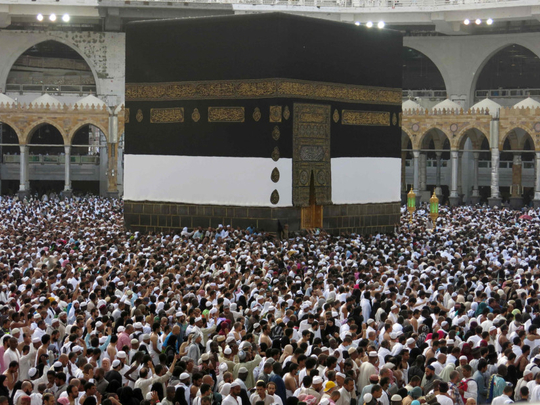
Millions of Muslims from across the globe have gathered in Makkah and its vicinity to partake in the annual Haj ritual. The pilgrims from both genders come in all colours. They understand that the sacrament that they had set upon is not simply one of donning an Ihram (a plain, white, unstitched piece of cloth for men) and perfunctorily going through the motions.
It is a time like this when I wish that diehard Islamophobes witness for themselves what these pilgrims are up to. They have not gathered in Makkah to declare war on anyone. They have not come with the aim of recruiting forces to spread terrorism. There are no sermons exhorting violence and mayhem against the rest of mankind. Instead, it is a personal journey for one and all, a journey whose foundation is peace and acceptance of all of God’s creations.
Haj in its most basic meaning translates into an act “to continuously strive to reach one’s goal”. It is the last of the five pillars of Islam. The other four being a declaration of faith in one God and in Prophet Muhammad (PBUH), the five daily prayers, offering regular charity and fasting during the month of Ramadan. Pilgrimage is a once-in-a-lifetime obligation only for those who have the physical and financial ability to undertake such an arduous journey.
While all great religions state that humans are more than mere physical creatures in that we possess an essence beyond the material world, in Islam, Haj summarises the spiritual journey towards this essence. Haj is unquestionably the most demanding of all Islamic rituals and the Prophet (PBUH) said: “Whoever performs Haj to this house — Ka’bah — and does not commit any obscenity and wrongdoing, he or she will come out as the day he or she was born — pure and free from sins.”
During these days of worship, pilgrims have the opportunity to correct their faults, to sincerely atone for their worldly sins and make up for any shortcomings or wrongdoings of their past. Deeply engrossed in prayers, the pilgrims seek Allah’s mercy. The conglomeration of millions of Muslims — rising above geographical, linguistic, cultural, ethnic, colour, economic and social barriers, who converge in Makkah — is a tribute to the universality of the Haj.
An Islamic scholar, while describing the experiences of Haj said it could be overwhelming: “Imagine yourself stepping on the same land where Prophet Mohammad (PBUH) used to step and going through valleys and mountains wherein he used to receive the divine revelation. It gives you another perspective of how much he and his companions did suffer in order to get this message communicated to us in its most perfect and purest form.”
“When you go to the mountain of Heraa’, you realise that this is the same place where the Prophet (PBUH) used to seclude himself from the whole world for one month every year. It is the place that witnessed the revelation of the first words of the Quran and the appearance of the arch-angel Gabriel. When you move in the Sacred Mosque of Makkah and remember prophet Abraham and his son Ishmael, you can feel the true meanings of sacrifice and how a father left his newborn with his weak mother in that barren piece of land.”
The rigours of the pilgrims is not simply mindless exercises prescribed in textbooks for them to blindly follow, and then carry home as a plaque of ‘being there’. This gathering of such a large and diverse group of Muslims is also meant to strengthen and renew bonds across many borders and their diverse inhabitants.
In his last Haj sermon, the Prophet (PBUH) advised those present to convey the meaning and message of the rituals they had just performed to those who were absent from this great assembly. Thus, a pilgrim’s journey does not end simply with the completion of rituals, but he or she is also responsible for carrying the message back to their homelands.
It is crucial in today’s times that the real meaning of Islam is promoted far and wide by pilgrims returning from Haj, especially to those of other faiths. Thugs and terrorists posing as Muslims and going about killing and blowing up people have created a lot of misconceptions about Islam in much of the non-Islamic media. Islam is far removed from such activity and that is the message that must be conveyed to those who view Muslims and their intentions with suspicion.
So dear Hajis, dedicate yourselves to the true meaning of Islam, a religion of peace. Resist the calls of those who exhort to violence and mayhem. And, above all, spread this message of peace and goodwill with vigour upon returning back to your lands and people. Let your non-Muslims friends, neighbours and co-workers know why you undertook the journey, what you saw and what you gained.
Tariq A. Al Maeena is a Saudi socio-political commentator. He lives in Jeddah, Saudi Arabia.










